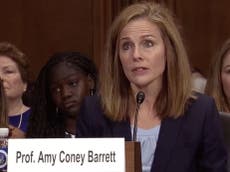Analysis: Why Trump was never going to nominate a Cuban-American woman for the Supreme Court
Analysis: The president’s campaign has always been about white evangelical voters, and his high court pick reflected that
Your support helps us to tell the story
From reproductive rights to climate change to Big Tech, The Independent is on the ground when the story is developing. Whether it's investigating the financials of Elon Musk's pro-Trump PAC or producing our latest documentary, 'The A Word', which shines a light on the American women fighting for reproductive rights, we know how important it is to parse out the facts from the messaging.
At such a critical moment in US history, we need reporters on the ground. Your donation allows us to keep sending journalists to speak to both sides of the story.
The Independent is trusted by Americans across the entire political spectrum. And unlike many other quality news outlets, we choose not to lock Americans out of our reporting and analysis with paywalls. We believe quality journalism should be available to everyone, paid for by those who can afford it.
Your support makes all the difference.Did anyone really think Donald Trump, in the midst of an election all about ensuring a big turn out from his almost exclusively white conservative base, would nominate a Cuban American to the highest court on the land?
It always was going to be Amy Coney Barrett, a White Catholic mother of seven from the Midwest. No, from the Rust Belt.
Mr Trump’s campaign is dialed into states like Ohio, Pennsylvania, Michigan, Wisconsin, and to a lesser extent, Minnesota.
The Belt of Rust.
His, at least semi-public consideration of Florida-based federal Barbara Logoa, was aimed at Hispanic voters in Florida and other key swing states. He is not the first sitting president to consider election year politics while choosing a supreme court nominee.
In a recent television interview, former President Bill Clinton said he considered several then-Cabinet members when he nominated Ruth Bader Ginsburg to the seat that Ms Barrett likely will fill before year’s end — if not by Election Day. But Mr Clinton admitted he kept several Cabinet members in place because they did not help him in enough battleground states.
Mr. Trump has worked hard to keep the sunshine State in his column after nearly winning it four years ago. He has held multiple official events and campaign rallies there each year. He even changed his official residence to Florida, departing his native New York City after seven decades.
In short, a single judge nomination was never going to be the deciding factor in Florida, where polls show the economy and Covid-19 are bigger issues to voters.
Mr Trump predicted during a Thursday night rally in Jacksonville that he would again win the state, citing his big rally crowd that night.
“We’re not losing Florida,” the president vowed on a day when his general election foe, former Vice President Joe Biden, was again at home in Wilmington, Delaware. “You can just feel it.”
His campaign aides feel it too, saying their internal campaign polls show Mr Trump ahead even though RealClearPolitics’ average of multiple polls show a dead heat in the president’s new home state.
The president has never reached beyond his base, never crossed the political aisle in any meaningful way to pass legislation that meant very much to moderate Democratic voters.
He let his base know his pick was for them during a late-night campaign rally in Newport News, Virginia, on Friday night.
“You know they say the biggest thing you can do is the appointment of judges, but especially the appointment of Supreme Court justices,” he said before a crowd of local and public officials called “gargantuan” even before they filed into and around an airport hangar that required the president to use the smaller version of Air Force One.
He talked under darkness that night of Republican voters needing to hit the polls in big numbers to, in his words, “uphold religious liberty, free speech and the right to keep and bear arms Virginia.”
A day later, shortly after announcing the white 48-year-old white Barrett, he let his base know he thinks it was her, not the Cuban-American Logoa who reflected his and their views.
“I think it’s very hard. Where?” he said. “I think it’s very hard. … I think it’ll send a great signal to a lot of people.”




Join our commenting forum
Join thought-provoking conversations, follow other Independent readers and see their replies
Comments